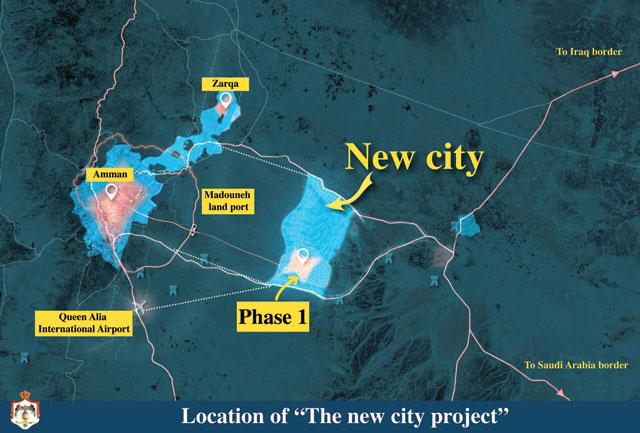You are here
Meeting reflects public’s concerns over plans for new city
By Hana Namrouqa - Dec 04,2017 - Last updated at Dec 04,2017

AMMAN — The first event to discuss the government’s plan to build a new city on the outskirts of Amman reflected the public’s thirst for details on the planned metropolitan area.
Who will run the new city, how will the government cater for its water needs in light of an existing water shortage, what is the scale of investments that will be channelled into the new city, how much will it contribute to the GDP and what role will the local private sector have in its construction journey were some of the many questions the event’s attendees raised.
The meeting, which was organised by EDAMA to discuss the new city as a business opportunity for public engagement, reflected the need of the public to know more details on the planned new city.
At a panel discussion, Amman Mayor Yousef Shawarbeh reiterated the government’s plan to set up an entity dedicated to managing and running the new city, highlighting that neither the Greater Amman Municipality (GAM) nor any other governorate will be linked to the city in terms of urban planning or regulation.
After telling participants that the government should announce further details on the mega-scheme once its studies and blueprints are finalised, Shawarbeh addressed some of the participants’ concerns stressing that the new city will not overshadow Amman.
“No one in the Jordanian state will allow for the capital to be neglected; building a new city doesn’t mean that Amman will become a victim… implementation of Amman’s strategic projects in transportation, its legislations and the implementation of its master plan will not stop,” the mayor stressed.
Figures show that the future of Amman will be “very difficult” in terms of population growth, Shawarbeh said, highlighting that the new city’s goal is also to take off some of the pressure placed on the capital.
Shawarbeh outlined the main challenges facing Amman including traffic congestion which he described as “Ammanites’ daily suffering”, the unnatural population growth in the capital, the state of its environment related to water scarcity, the air quality in light of the huge number of vehicles on Amman’s streets and the need for increasing green spaces and shifting to green buildings.
Urban planning expert and architect, Murad Kalaldeh, who was part of the panel moderated by Al Rai newspaper’s business editor, Isam Qadamani, highlighted that establishing a new city close to Amman and Zarqa seeks to create growth poles that induce economic development.
“I have visited the location of the planned new city: it is good and suitable for a project of such a scale,” Kalaldeh said.
On the other hand, the expert voiced concern on whether the project will actually see the light, noting that, despite being a good idea, it is proposed on a very large scale.
The government announced the national project to establish a new city early last month, saying that it aims at accommodating part of the accelerating urban expansion of Amman and Zarqa, among other cities, and providing convenient alternatives to citizens in terms of quality of residences, as well as alleviating pressure and overcrowding in major cities.
Under the scheme, a new, smart, sustainable city will be built, equipped with all infrastructure services and will adopt a long-term urban planning system. Developers from the private sector will rehabilitate the location and lay the infrastructure under a build-operate-transfer formula.
The project will be implemented in five phases, with the area of the first phase of the project being estimated at 39 square kilometres, representing some 10 per cent of the scheme’s total area.
The first stage is expected to be completed by 2030, while the whole project is planned to conclude in 2050.
The new city will be 30 kilometres away from Amman, 30km from Zarqa and 33km from the Queen Alia International Airport. It will also be located on the international roads linking the Kingdom with Saudi Arabia and Iraq.
The scheme will be established on and surrounded by state-owned lands, according to the government, which said that ministries and public departments will constitute the main pillar of the new city.
Related Articles
AMMAN — The government on Sunday officially announced a national project to establish a new city, described as one of the key strategic sche
AMMAN — The government is looking into a project to distribute plots of lands to civil servants and military retirees in areas adjacent to t
AMMAN — Outlining a comprehensive, long-term plan and ensuring intergovernmental commitment are essential to the success of the new ci


















